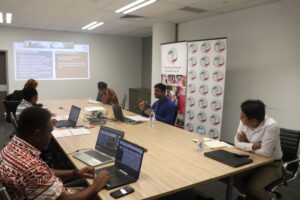
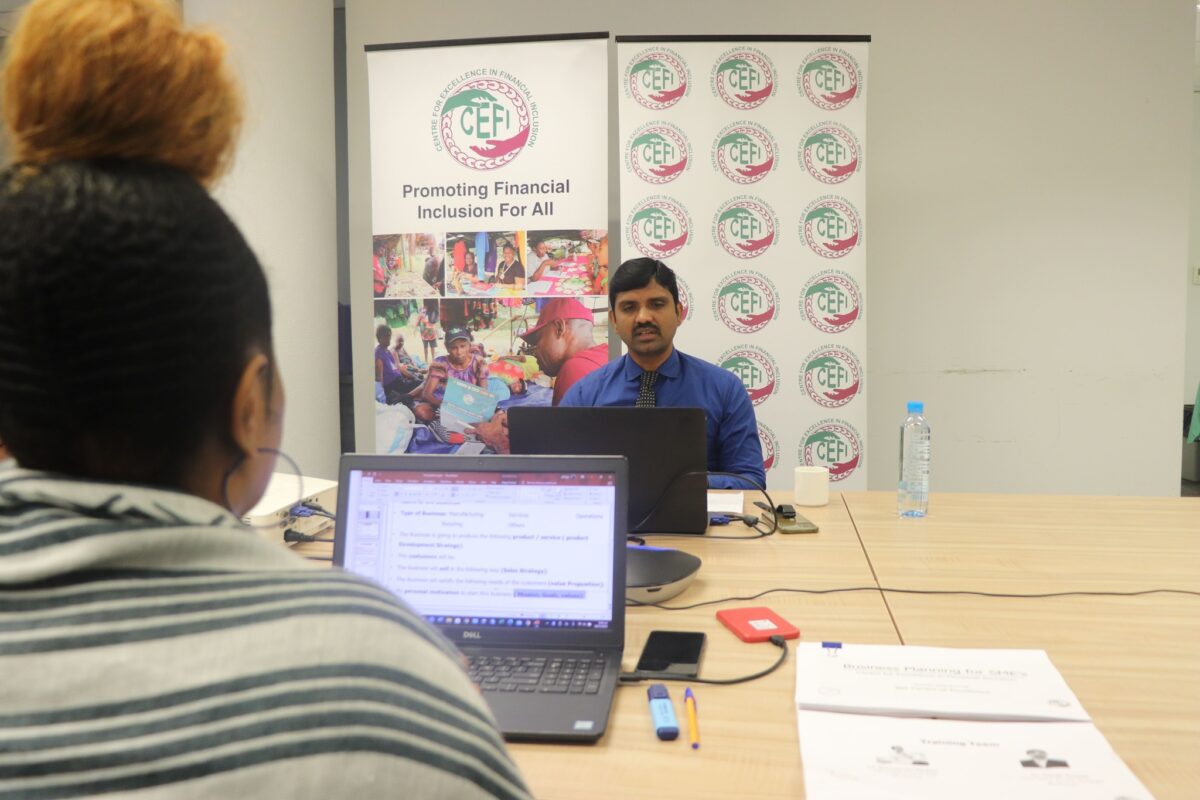




The Centre for Excellence in Financial Inclusion (CEFI) can play a significant role in enabling top-tier transparency and financial inclusion in Papua New Guinea (PNG) and the South Pacific. Here are some ways in which CEFI can intervene to achieve this:
Overall, CEFI can play a critical role in promoting financial inclusion and transparency in PNG and the South Pacific. By improving access to financial services, promoting financial literacy, and encouraging best practices among financial institutions, CEFI can help ensure that individuals and communities in the region can participate fully in the economy and achieve their financial goals.
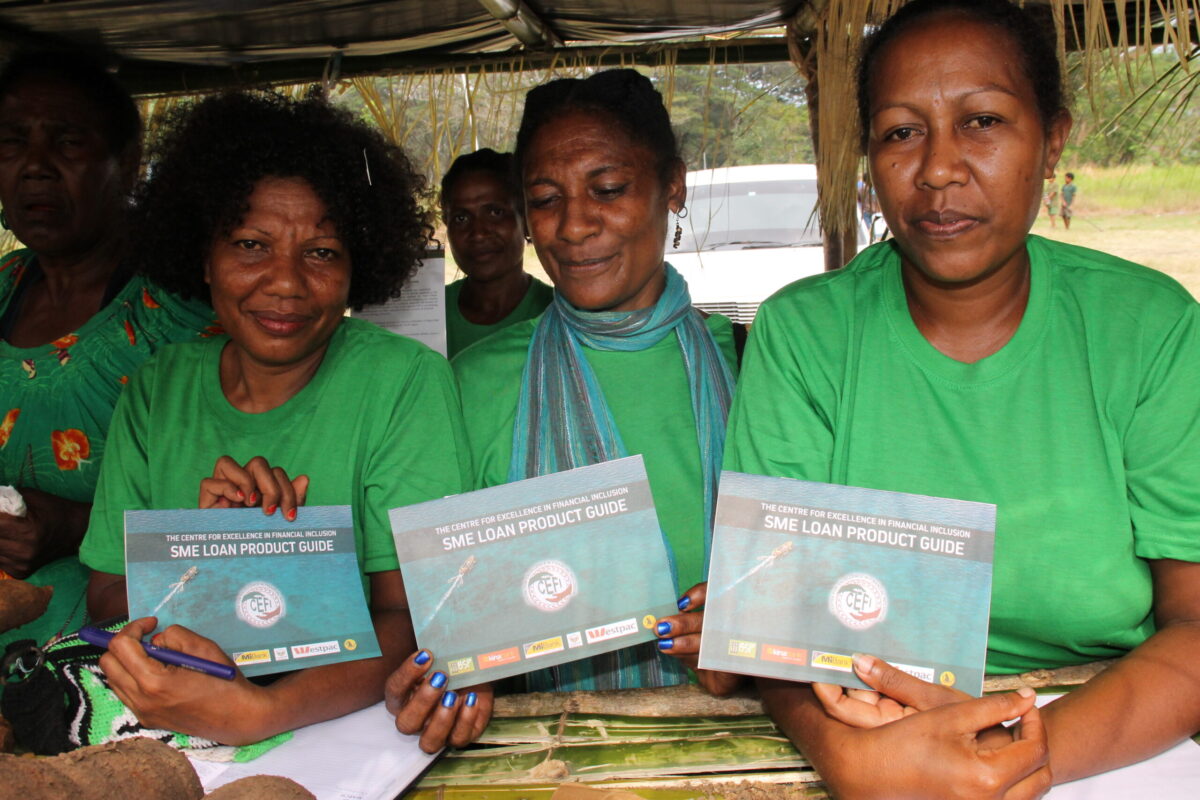
the Centre for Excellence in Financial Inclusion, can play a significant role in providing financial literacy for the grass roots in Papua New Guinea (PNG). Financial literacy is crucial for individuals and communities to make informed decisions about their finances, including managing their income, savings, investments, and debt.
Here are some ways in which CEFI can intervene in providing financial literacy for the grass roots in PNG:
Overall, CEFI can play an important role in improving financial literacy and promoting financial inclusion in Papua New Guinea. By providing individuals and communities with the knowledge and tools they need to manage their finances, CEFI can help promote economic growth and development in the region.
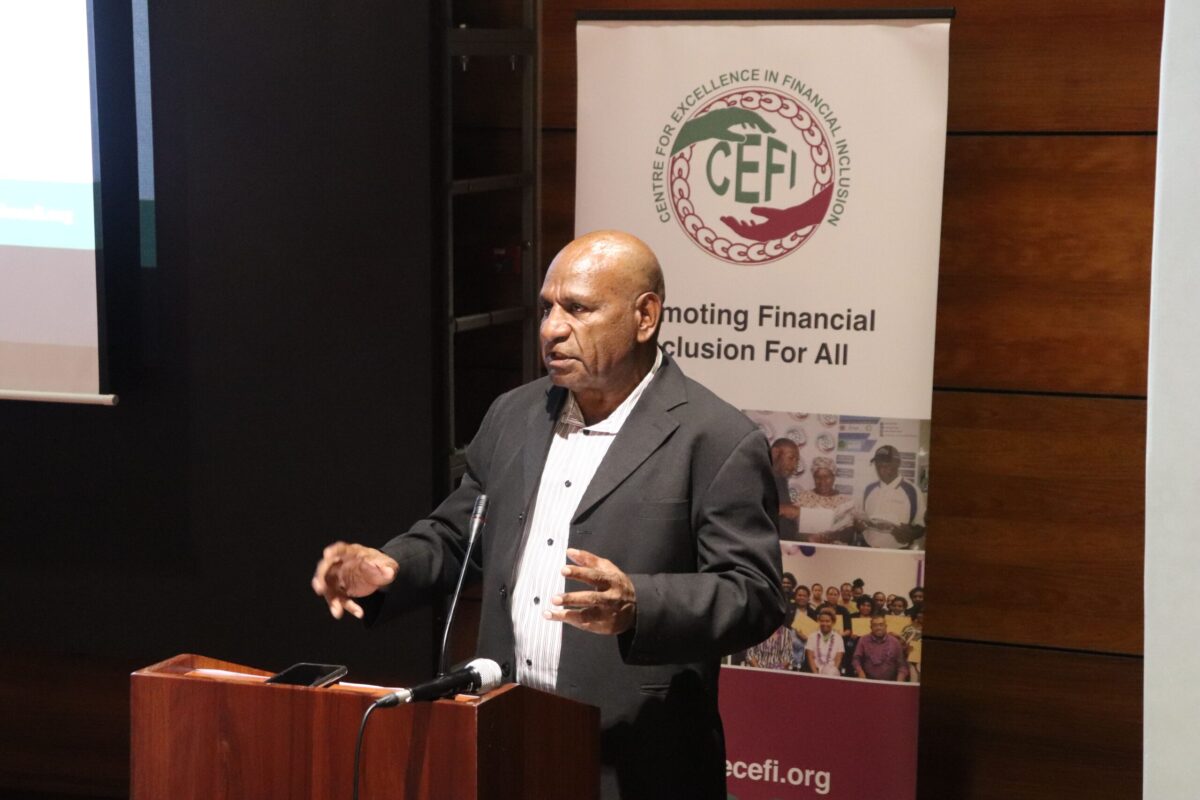
The Centre for Excellence in Financial Inclusion (CEFI) and the PNG Institute of Banking and Business Management (IBBM) had an open day to officially commence the applications for the second batch of the Online Certified Microfinance Course on Monday February 20, 2023 in Port Moresby.
The Online Certified Microfinance Professional Course was first launched in 2021 with the first batch of 23 participants successfully on boarded and which will be graduating in April 2023. CEFI in partnership with IBBM created the Microfinance Professionals Course in Papua New Guinea to fulfil the need of the industry and to create a pool of professionals for the expanding industry. The course will help banking staff and banking and finance students obtain professional qualification to be successful in a dynamic environment and acquire new skills in microfinance and build competence in areas to meet the diverse needs of different market segments.
IBBM Lecturer, Ignatius Timothy presented the course and indicated that the materials cover aspects of important microfinance subjects under three levels. Level 1 is a certificate course designed for frontline staff in microfinance institutions who wish to build Strong Customer Services in Microfinance skills for undertaking customer service, marketing and credit lending roles. Level 2 certificate course is an advanced program and is intended for those who wish to deepen and expand their competence in Delinquency Management in Microfinance skills. And Level 3 course certificate is an advanced certificate designed for those who wish to develop an advanced level of Financial Management in Microfinance skills. And in all aspects of this skills will enable an individual ability to apply new skills and judgement in a more complex business operations at a higher management level.
IBBM CEO, Susil Kongoi acknowledged the ongoing support from CEFI, financial institutions and stakeholders for the partnership with IBBM in continuing the online microfinance courses.
The Executive Director for CEFI, Mr. Garima Tonga encouraged financial institutions to work in partnership with CEFI to boost microfinance in the country, through creating an enabling platform for their staff to learn and grow in the industry. He further welcomes them to start nominating their staff to attend the course, as batch number 2 nominees.
“It is an exciting program (Online Certified Microfinance Professional Course), and CEFI has developed this new e-Learning platform and will continue to look forward to maintain it with the software developer and IBBM and try to bring the best out of this program to the partner financial institutions.”
“CEFI is looking forward to working with IBBM and Bank of PNG as we take this platform to the next level,” Mr. Tongia said.
Bank of Papua New Guinea Acting Assistant Governor, Mr. George Awap in his keynote address re-emphasised the important objective of the course, which is to build a pipeline of professionals for the growing microfinance industry. Mr. Awap stated that microfinance is a growing industry and acknowledged microfinance banks for using technology to reach rural Papua New Guinea.
“(This course) provides greater opportunity to financial institutions to train as many people as they can because if they understand the principles and concepts of microfinance in both the supply side and the demand side, to improve customer satisfaction.”
“It is also encouraging to note that 17 people have completed the Batch One Course successfully and will be graduating in April this year,” Mr. Awap said.
The Certified Online Microfinance Professional Course was introduced in 2021 to provide an opportunity to obtain theoretical knowledge on the concept of microfinance. Learnings from the Microfinance Expansion Project, microfinance training is incorporated into this course as the sustainable arm of the concept. An important aspect of online training is that you can study during your free time without disrupting your other work.
Interested applicants can email info@thecefi.org for more information on the Online Certified Microfinance Professional Course.

The Center for Excellence in Financial Inclusion (CEFI) celebrated International Women’s Day (IWD) with the theme ‘DigitAll: Innovation and Technology for Gender Equality.’
Fourteen Women in Small and Medium Enterprise (WSMEs) businesses under the Ledger Pal App Pilot Project were invited by CEFI to attend the IWD celebration-activities and had the privilege of listening to two national digital online entrepreneurs sharing their experiences of conducting business in the digital platform. These women entrepreneurs were, Ms. Ginia Sialis, Director and Business Owner of Tapioca Delight and Ms. Deslisha Wasem, Owner of Shebon Kiddy Box. Two other senior women, Ms. Naime Kilamanu, Chief Information Officer (ICT) – Bank of PNG and Ms. Fulaiyo James, Project Manager – MiBank, also spoke to the women on their experience of working in leadership roles in their respective financial institutions.
CEFI Executive Director, Mr. Garima Tongia when speaking at the IWD event on Wednesday March 8, told the women that CEFI recognises the importance of innovations and technology in the financial inclusion space.
“At CEFI we realise that bringing women out from the subsistence informal sector into the formal monetised economy will empower them to contribute meaningfully to their families and communities thereby wining the respect from those in the community including the men folk and hence being recognised as equals,” Mr. Tongia said.
“CEFI wants to ensure an additional one million women are banked during the period 2023 – 2027. As at September 2022, we have 1.4 million accounts for women from the total 3.8 million representing 37%,” said Mr. Tongia when highlighting the importance of women’s inclusion in the monetised economy.
Bank of Papua New Guinea Acting Assistant Governor, Mr. George Awap encouraged the women that to empower women economically would mean providing opportunities for women to venture into sustainable income generating activities so they are recognised as important contributors to family welfare. Mr. Awap said the sad reality in PNG is that many basic services including banking cannot reach many women and also men due to the harsh geographical terrains, high security risks and rundown public infrastructures.
“Technological innovations remain the answer to basic service delivery including banking in a country like PNG,” Mr. Awap said.
CEFI Financial Inclusion Adviser, Mr. Saliya Ranasinghe when speaking on the topic of Potential for Women Business, Vision for the Future, said technology has created new opportunities for women and great opportunities for business.
“Digital literacy has become an important aspect and that the businesswomen need to build a long-term vision for its business and build a strong partnership with the banking sector.”
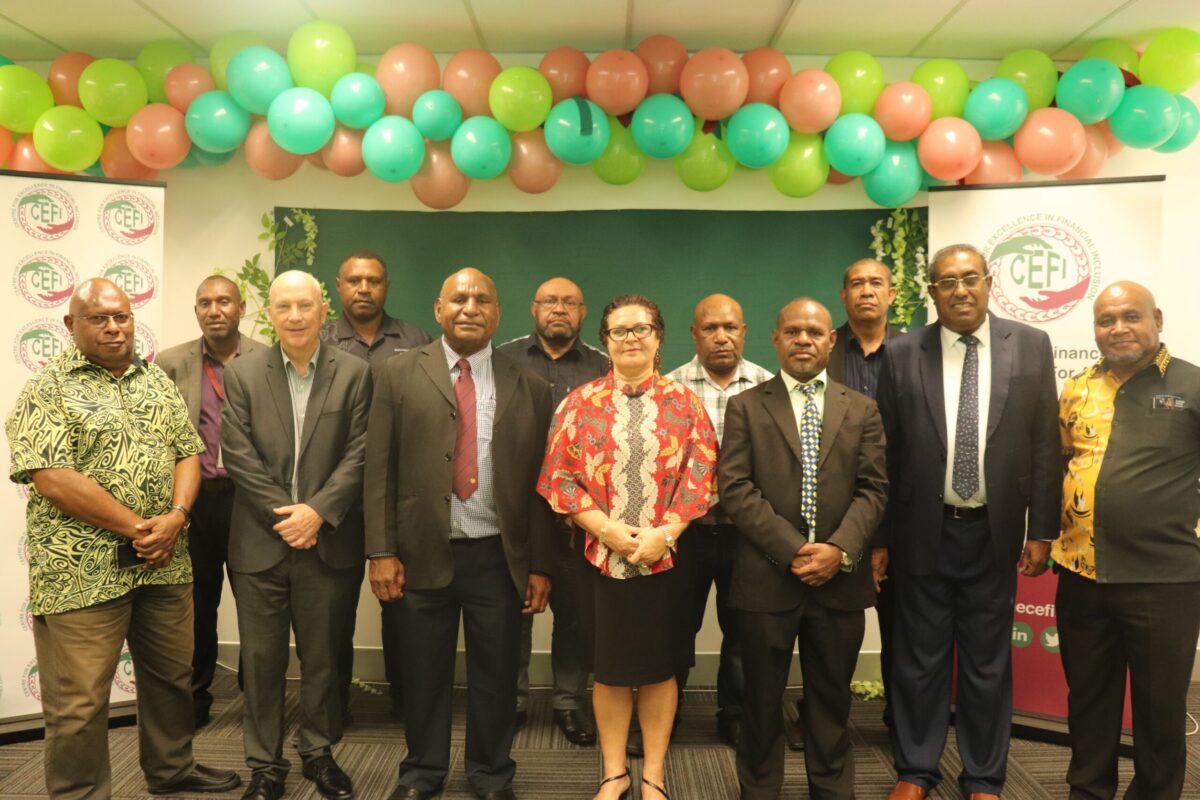
The Centre for Excellence in Financial Inclusion (CEFI) commemorated its 10-year anniversary in a small but significant ceremony at its Port Moresby office on Friday March 24.
CEFI’s humble beginning was the outcome of the Microfinance Expansion Project in 2013, under the direction of the Bank of Papua New Guinea, Department of National Planning and Department of Treasury.
Since its establishment 10 years ago, CEFI has grown from strength to strength in becoming the leading industry apex organisation in coordinating, advocating and monitoring financial inclusion activities in Papua New Guinea.
CEFI Executive Director, Mr. Garima Tongia during his opening remarks acknowledged Bank of PNG, CEFI Board Members, CEFI staff, stakeholders and partners for playing very important roles in ensuring CEFI continued to carry out its mandate in financial inclusion.
Acting Governor of Bank of PNG and Chair of CEFI Board, Mrs. Elizabeth Genia during her congratulatory remarks applauded CEFI’s accomplishments in areas of financial literacy training, developing and implementing financial inclusion policies and documents and partnering with key stakeholders to deliver financial inclusion projects.
“It’s important to note CEFI board members and staff contribution to achieving this important financial inclusion milestone and also gratifying to see that the financial inclusion agenda is being actively promoted,” Mrs. Genia said.
The Acting Governor highlighted CEFI’s partnership with financial institutions in the area of financial literacy training stressing on CEFI’s collaboration with its partners to deliver financial literacy training to over 350,000 Papua New Guineans.
“CEFI is now trying to work with an international agency to conduct impact assessment of the trainings delivered and improve the training material,” Mrs. Genia added.
She praised CEFI’s dedicated strategy in using innovative technology to attract more women into the financial mainstream and economically empower them.
Some of the important projects that CEFI have used to bring gender equity into the financial inclusion domain include, introduction of the Ledger Pal Application for women SMEs, digital online training for women and development of a financial literacy mobile application.
Mrs. Genia also highlighted CEFI’s financial inclusion strategies developed and implemented in partnership with its important stakeholders from Government and private sectors between 2014 and 2020 and the participation of women in CEFI’s training programs.
Mrs. Genia also thanked Bank of PNG for some of its initiatives such as the SME Accelerator Program, Financial Consumer Protection, National Payment System and the Regulatory Sandbox approach, that supplemented the work of CEFI by providing assistance for Papua New Guineans to access knowledge, skills and information to run projects and businesses in the financial inclusive space.
Acting Assistant Governor, Financial System Stability Group, Bank of PNG, Mr. George Awap, who played a very key role in CEFI’s establishment, paid tribute and gave recognition to important key stakeholders who had worked with CEFI during the 10 years such as the Bank of PNG, the National Government, Asian Development Bank, Alliance for Financial Inclusion, World Bank and International Finance Corporation.
Mr. Awap acknowledged former governors of Bank of PNG for the foresight in supporting and driving the agenda of financial inclusion in PNG.
CEFI’s Financial Inclusion Adviser, Mr. Saliya Ranasinghe who was the organisation’s second Executive Director, reflected on some of CEFI’s key achievements including, NEC’s approval for CEFI established as an organisation, development of financial literacy training materials, development of the first financial inclusion strategy, launching and implementation of the financial inclusive strategy, partnerships with international agencies, statutory authorities, provincial governments, civil societies, and the many other important stakeholders that CEFI works with and continues to collaborate in the financial inclusion space.